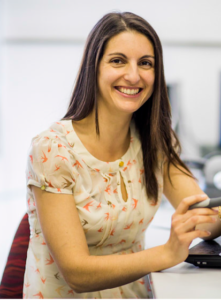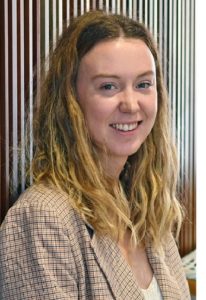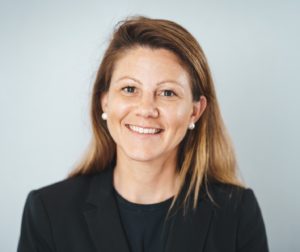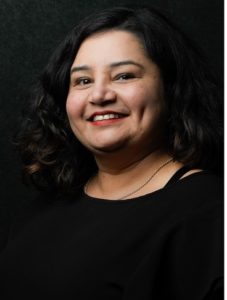International Women in Engineering Day on 23 June celebrated the achievements of women working in engineering. This year’s theme – Shape the World – is appropriately reflected in some of the emerging and acclaimed women engineers within our Flinders University community. A morning tea was held to celebrate the amazing MDRI engineering women. Our engineers were asked why they became engineers and what important advice would they give to women starting their careers.
Introducing some of our engineering experts…

Professor Karen Reynolds
While her sister preferred dolls, Professor Karen Reynolds gravitated to tools in her childhood and fixing things with her father. Decades later, the physics and biomedical engineering graduate and previous SA Scientist of the Year established the award-winning Medical Device Partnering Program (MDPP) led by Flinders University, and is now managing its national expansion.
“Working closely with end-users and clinicians we are able to respond to industry-driven problems, fast-forwarding the R&D process.” More on Karen Reynolds
Dr Olivia Lockwood
What does an average day look like for you?
I work as the Manager of the Research and Teaching Team in the Biomedical Engineering Department in the Flinders Medical Centre. In this role I manage a small group of staff and supervise medical and engineering undergrads and postgrad students. I am responsible for liaising with clinical and research staff to understand their needs, and working collaboratively to develop a technology solution to support their work
An average day involves
- Touching base with my staff and students to see how they are progressing on their projects and to discuss work priorities, resources and roadblocks.
- Talking with clinical and research staff about their work to understand what they need from the team.
- Researching and learning new things.
- Following design standards and complying with regulations.
Why did you choose to become an engineer? What were the major factors in your decision?
I enjoy problem solving and helping people.
As a woman working in engineering, do you have any role models that you look up to – both inside and outside your field?
Marie Curie and Jacinda Ardern
In your opinion, why is it important that more women take up engineering in the near future?
‘If you can’t see it you can’t be it’ – women working in engineering fields can inspire other young women to explore a job in engineering. This is important as it helps to encourage diversity in the workplace, which has so many benefits.
What’s the most important piece of advice you’d give to a woman thinking of starting a career in engineering?
Be confident in your skills, speak up and don’t be afraid of what you don’t understand. It is an opportunity to learn.
In ten words or fewer, why do you love engineering?
Finding the solution to something that seems impossible
Miss Lauren Wearne
What does an average day look like for you?
My day changes depending on what needs to be done! Normally either myself or another team member will autocondition the micro-CT. Why this is happening, I like to read an article on some research within my area (bone biomechanics and tibia tray implants). But that’s about where the similarities end!
I am at the start of my PhD, so at the moment I have some initial data and we are trying to see the best protocol for when I go on to collect my actual data. As I am working with CT images and digital volume correlation, this involves manipulating the images. As a result, most days will include data analysis in some form. This could be reconstructing micro-CT scans with different parameters and seeing their effect, coding on MATLAB to filter the data, trying different techniques to remove unwanted aspects of the images and then overall considering the results from all these changes.
I also tutor, so some of my time is dedicated to this, whether that be when I am in the tutorials, having meetings for them or am marking the student’s work.
We could also have other researchers or clinicians come in to get scans from the micro-CT. So far, amongst other things, we have scanned full cadaveric hips with implants, teeth from a wombat and also a kangaroo, bird skeletons and 500yr old fish!
Why did you choose to become an engineer? What were the major factors in your decision?
I was always stronger in the maths and science topics at school, however I wasn’t sure on what I wanted to study afterwards. Through an online career quiz, Biomedical Engineering popped up. I was immediately drawn to how personal it is; working on problems that affect people daily. It is an inspiring field to be a part of and I love the creative side of it.
As a woman working in engineering, do you have any role models that you look up to – both inside and outside your field?
I think its important to have role models, but they do not necessarily have to be female. We can now aspire to occupy the same positions that men previously have.
Within my field and specifically within Tonsley, I admire the way that Mark Taylor conducts his research and how he interacts with other colleagues as well. He is a leader within his field and exceptionally busy, however (and in my experience) he treats everyone with the same respect and gives their research problems his full attention.
I am a huge fan of Jacinda Ardern. She appears to tackle really important issues (cultural inclusion, socio-economic equality and COVID-19 currently) with such compassion. I think she makes the policies of New Zealand accessible to the whole population, which is really important and not often seen.
In your opinion, why is it important that more women take up engineering in the near future?
I definitely think that the engineering workforce is changing and diversifying. The major issue at the moment is that there are not enough women in the higher-level roles (CEOs, department leaders, etc). As a result, younger women may not think that these pathways are open to them. If we have more women entering at graduate level than there is a better pool for future female candidates of these roles. This will hopefully go on to inspire the next generation of female leaders.
What’s the most important piece of advice you’d give to a woman thinking of starting a career in engineering?
Use your voice and back yourself.
In ten words or fewer, why do you love engineering?
We tackle problems that impact people on a daily basis.
Dr Sherry Randhawa
Robotics to biomedical engineering, electronics and computer systems, Dr Sherry Randhawa has taught them all. The talented engineer has many accolades to her name, and right now she’s loving educating tomorrow’s engineers as Teaching Program Director for Engineering and Design at Flinders University.
“My greatest success is seeing my students evolve and grow from knowing little about engineering in their first year to when they graduate as highly qualified engineers after four years.”
What was it that enticed you towards engineering?
The ability to use logical and analytical thinking to solve problems. (And that I love Maths!)
What would you consider your greatest success in engineering ?
My greatest success is seeing my students evolve and grow from knowing little about engineering in their first year to when they graduate as highly qualified engineers after four years.
In terms of research, that would be when I saw the image processing algorithms developed during my PhD being realised in real-time on an FPGA! (FPGAs, Field Programmable Gate Arrays, are semiconductor devices based around a matrix of configurable logic blocks.)
Can you share an example of when you needed to be particularly creative?
As part of the IEEE SA Women in Engineering group, I have organised and run STEM Workshops for Rural Country High School Girls for the past five years. Our main objective is to raise awareness of STEM occupations amongst rural high school students (especially girls) and to encourage them to consider studying STEM subjects in their final years of school. We had to be creative in designing and developing exciting workshops to demonstrate to girls that doing STEM is fun and that they definitely have the ability to do it.
How do you attack a big challenge, or what do you do when the answer or way forward is not clear?
I try to see the problem from various sides and get a perspective. Understanding the problem takes time and patience, and having a positive outlook enables me to not fear the problem but rather look on it as an opportunity to learn and broaden my knowledge.
What words of wisdom would you share with your high school self?
To be brave and bold and seek new adventures. The world is your oyster; don’t be afraid to go beyond; you never know what treasures lie out there to be discovered…
Dr Melissa Ryan

What does an average day look like for you?
I spend time meeting and talking with people – researchers from within the university, people from external organisations and students. I get to spend some time in the labs testing or seeing some of the testing our researchers do; and I also spend a lot of time in front of my computer answering emails, writing up reports, and setting up or facilitating meetings.
Why did you choose to become an engineer? What were the major factors in your decision?
I actually started out studying occupational therapy… I really enjoyed maths at school but wanted a career where I could help people. After I left OT, a friend suggested biomedical engineering to me, and I never looked back. One of the things that drew me to engineering is the creative factor – in designing and problem solving, you get a lot of opportunity to bring in a bit of creative flair!
As a woman working in engineering, do you have any role models that you look up to – both inside and outside your field?
There a several females both within and outside of engineering that I take look up to. My current boss (who was also one of my supervisors during my PhD) is a female and leader in the field of engineering. She has and continues to be a fantastic mentor for me. I also take inspiration from strong females in leadership positions, especially those who have managed to juggle parenting with excelling in their given fields.
In your opinion, why is it important that more women take up engineering in the near future?
Diversity in any workforce is crucial, including diversity in gender. Females and males offer different views, and often communicate differently; I think it is valuable to have insight and advice from a range of perspectives. I think it is also important that we continue to have female role models across all sectors to ensure we maintain this diversity and there are opportunities for generations to come.
What’s the most important piece of advice you’d give to a woman thinking of starting a career in engineering?
Don’t be afraid of bringing your own way of doing things or own perspectives and find a good mentor.
In ten words or fewer, why do you love engineering?
Changing the world, improving lives, curiosity, creativity


